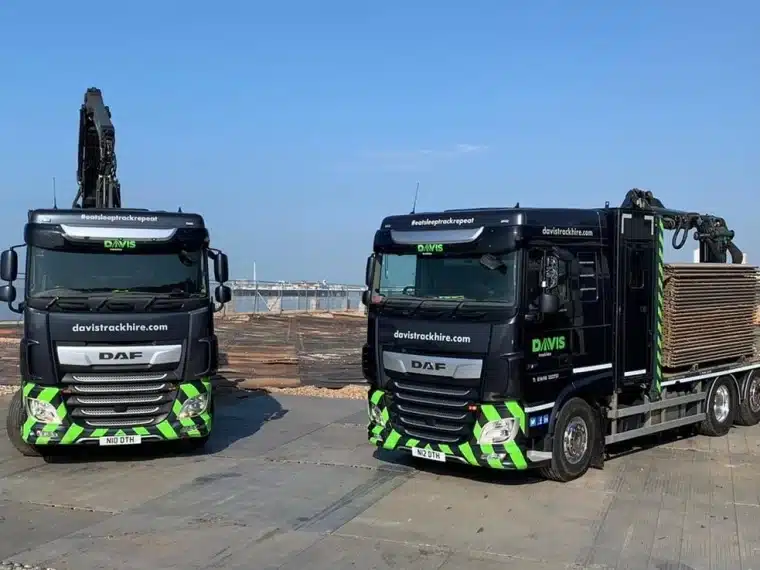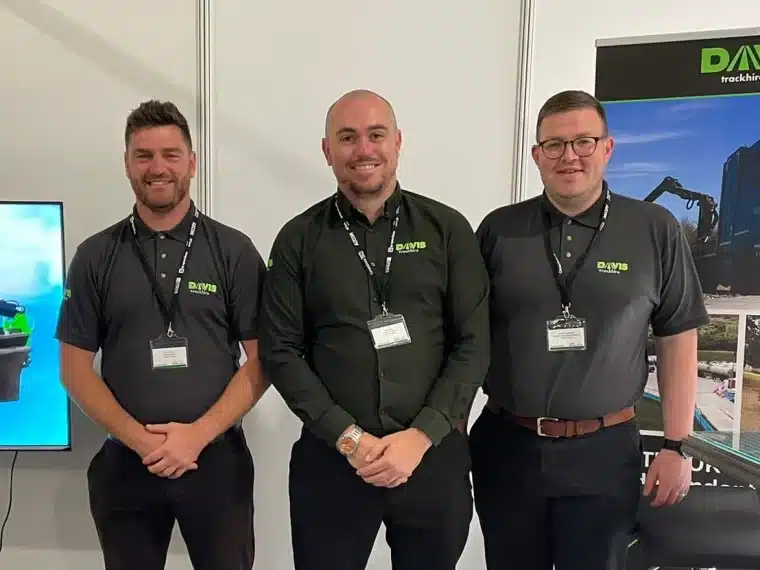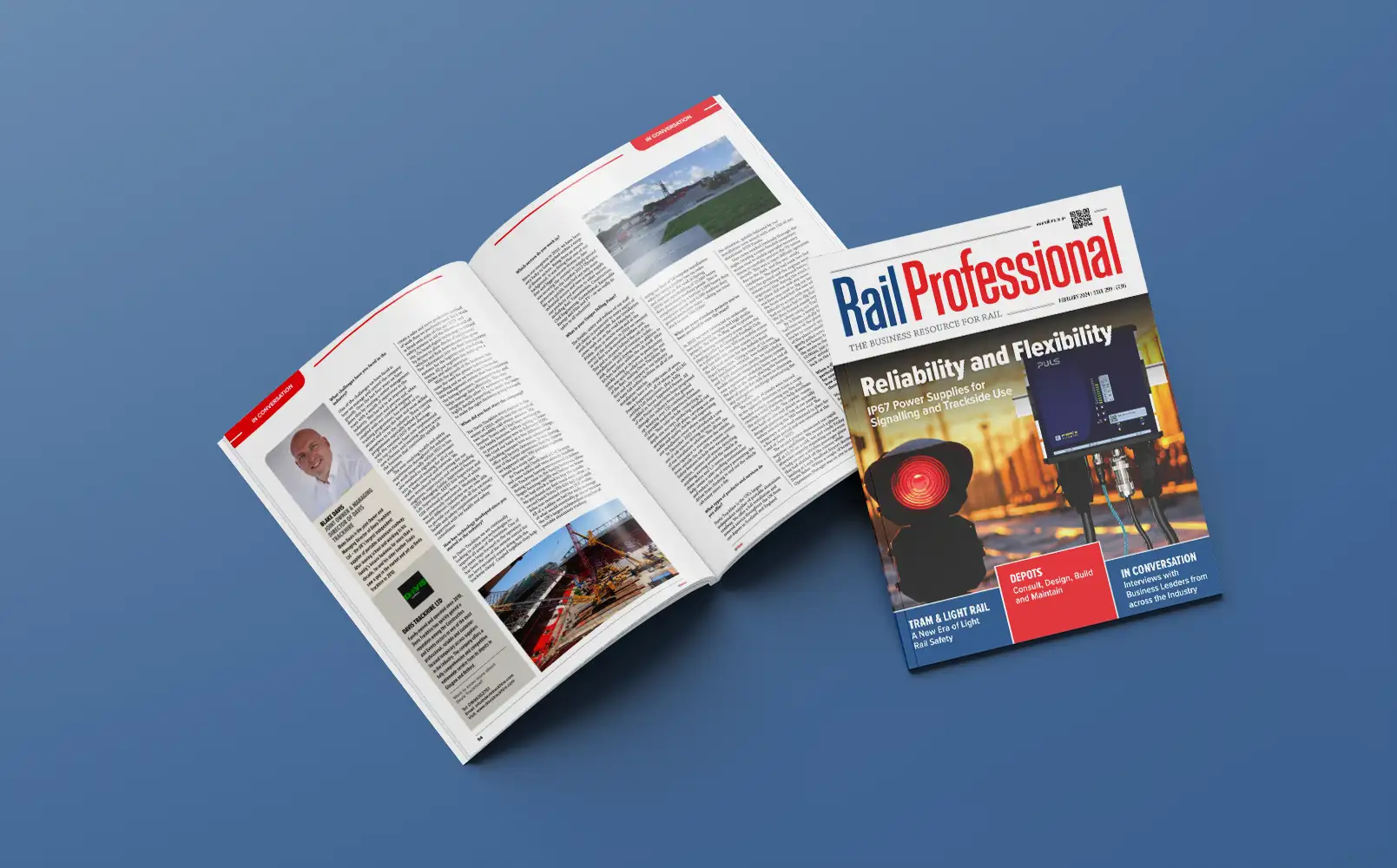Rail Professional Interview with Blake Davis, Managing Director of Davis Trackhire
What challenges have you faced in the industry?
One of the challenges we have faced is how we manage and control the company’s growth. Over the last four years, we have done this by creating a senior management team with a wealth of experience in the industry. This has led to an improved business structure and process and, when coupled with our continual employee training programmes, has enabled us to attract and create the best and most skilled operatives in the industry. These training programmes especially helped post covid with the national HGV driver shortage. On top of this, we have now implemented new schemes and training matrices across the business that continually upskill all employees.
The ever-evolving health and safety requirements throughout the industries we work in (especially within HS2) have also resulted in significant investment into enhanced training for all of our staff, both internal and external. We have introduced further training for our engineers, supervisors and crews including IOSH Managing Safely, Appointed Person, Lift Supervisors, SSSTS Site Supervisor and GS6 overhead power lines, much of which was previously outsourced. Working in many different industries we are now able to provide our clients with all the necessary health and safety requirements in-house, supported by our health and safety consultants.
How has technology developed since you started in the industry?
At Davis Trackhire we are continually looking to utilise new technologies to improve all areas of the business. One of the main leaps forward in the operation has been the use of the remote control for the lorry-mounted cranes along with the ‘trackway clamp’. Coupled together, they help create a safer and more productive method of work than we previously used. Each truck is fitted with state-of-the-art CCTV and safety systems to aid the drivers on and off-site. Onboard digital technology is utilised by drivers to allow checks of equipment/ vehicles and Risk Assessments that give ‘live’ information into the fleet management systems for the logistics and scheduling teams. All put together this helps give a slicker and safer operation.
With the growth of the business has come the need for greater information handling and so we now have a bespoke hire management system that has improved the hiring processes, automated tasks, and helps manage data effectively. This also integrates with other IT software to give highly detailed reporting to assist the team in making the right decisions going forward.
When did you first start the company?
The Davis Trackhire story started in the winter of 2010, which was the second of two incredibly cold winter seasons. My brother Travis and I had been working in the family business, before opting to leave to pursue pastures new in February 2010. We tried our hand at a few different things, including marquee hire and commercial office and factory clearances. It was during one of the latter operations that, by chance, we happened upon 200 portable roadway panels in a scrap yard.
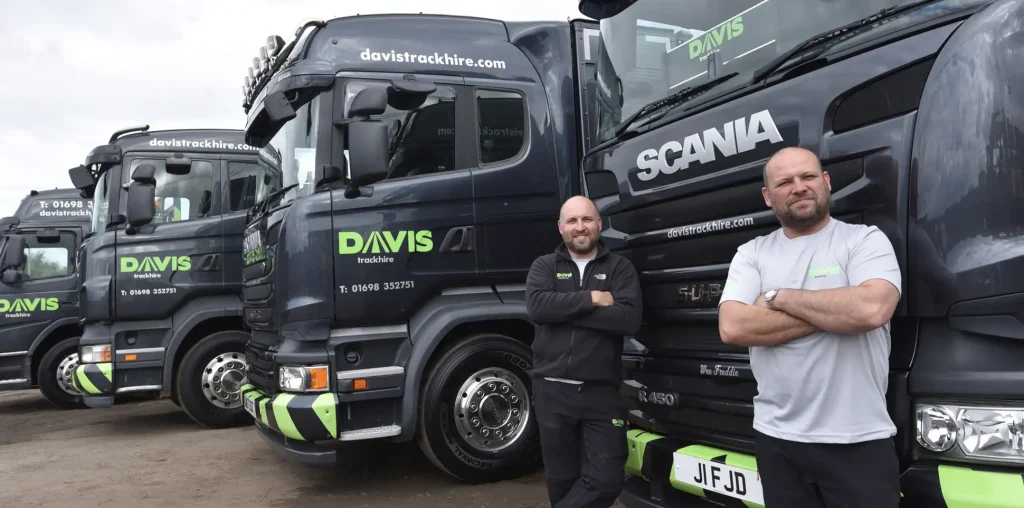
As Travis and I both held a C+E licence and crane tickets and were already familiar with Trackway having encountered it before during our time in the family business, ideas began forming rapidly and before we knew it, we had struck a deal to buy the panels. We purchased our first truck soon after – a second hand Volvo FM 420 4×2 rigid with Atlas rear-mounted crane and SDC trailer. All of a sudden we had the early makings of what would eventually go on to become the UK’s largest independent supplier of portable aluminium roadway.
Which sectors do you work in?
Since our inception in 2010, we have been very lucky to have worked within a range of diverse sectors. Being from an events background, it was fitting that one of our first and biggest success stories to date was securing the contract to supply ground protection for the London 2012 Olympics. We very quickly branched out into more industrial sectors and now actively supply our products and services to other sectors including Rail, Transmission, Construction, Civil Engineering, Geotechnical, Renewable Energy and Film and TV – so we really do tailor to all industries!
What is your Unique Selling Point?
The health, safety and welfare of our staff and clients is paramount to every aspect of the work that we undertake. As our installation crews work out on the road Monday to Friday, often in remote areas and at the mercy of the elements, in 2016 we invested in our first truck-mounted welfare unit. This pod is situated behind the cab of the installation vehicle and contains a toilet, sink, shower and drying room in addition to kitchen facilities within the cab itself. After quickly seeing an increase in productivity, this was quickly rolled out across the rest of the fleet, making Davis Trackhire the first and only company in our industry to have full welfare facilities on all of our installation vehicles.
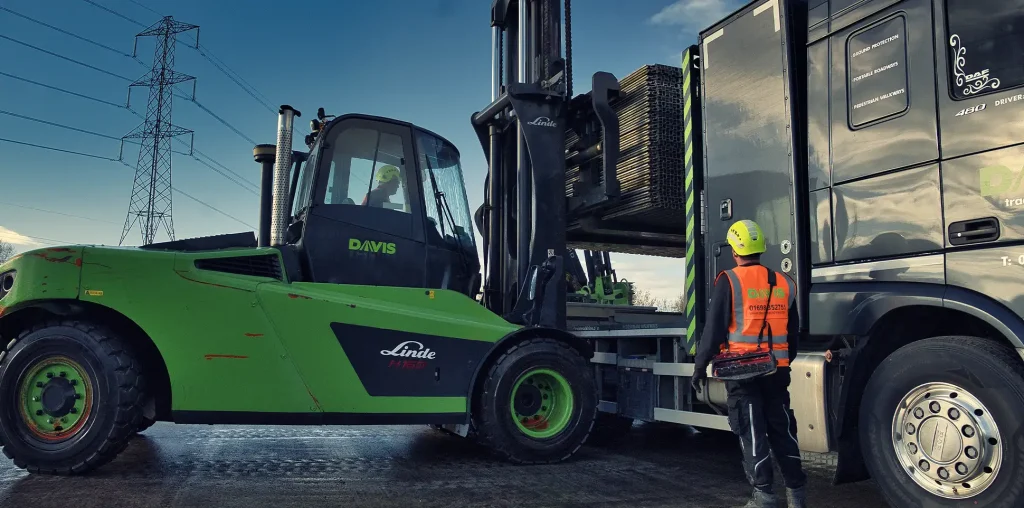
We also have a UK-wide team of seven Project Supervisors, all of whom are ALLMI certified Lift Supervisors, plus a fully qualified in-house Appointed Person. All of our Project Supervisors have progressed through the industry from the ground up, boasting over 120 combined years of portable roadway experience between them. Their roles include conducting in-depth site surveys, producing detailed risk assessments and lift plans, carrying out site audits and quality checks, and supervising our installation crews where required.
In December 2023, we introduced a new out-of-cab remote driving system to one of our installation vehicles. This allows the driver/operator to manoeuvre the vehicle from outside the cab with a remote control. Safety features include a rear-mounted monitor, cameras, and sensors detecting anything moving around the vehicle at three-metre and 1.5-metre distances to help create a safer working environment and reduce the risk of injury preventing the driver from climbing in and out the vehicle cab many times a day.
What types of products and services do you offer?
Davis Trackhire is the UK’s largest independent supplier of portable aluminium roadway. We offer a full installation and removal service throughout the UK from our depots in Scotland and England using our fleet of 14 bespoke installation vehicles (with a further two on order and expected on the road in Spring 2024) and stockholding of 15,000 heavy duty aluminium roadway panels. This is complimented by a further 2,000 heavy duty composite panels and 6,000 medium duty ground protection mats – taking our total stock to over 140,000m².
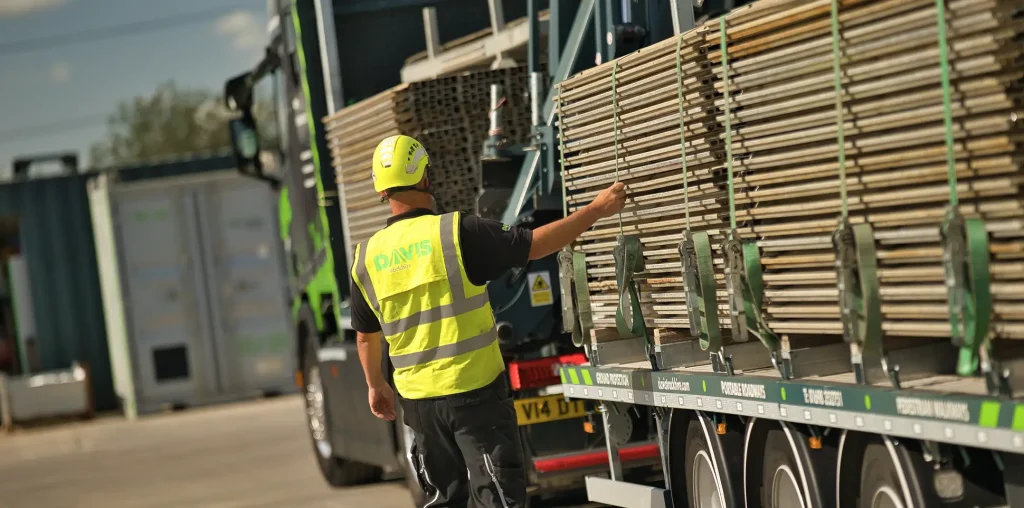
What are some standout projects you’ve been involved in over the years?
In 2023, we were contracted to undertake two particularly complex and high-profile projects. The first, in May, was to provide a load-bearing temporary access across the playing surface at Liverpool Football Club as a platform for two 300-ton mobile cranes and two 600-ton crawler cranes to remove the old roof section for the Anfield Road Stand Expansion. Using a team of 14 men, four installation vehicles, two forklift trucks and 1,375 aluminium panels, we installed a double-element temporary roadway system over a membrane underlay from one end of the pitch to the other, placing the bottom layer of panels flat-side down to eliminate any corrugation markings penetrating the pitch surface.
The top layer of panels were turned in the opposite direction to form a cross- bonded surface, removing any flex and creating a solid platform to help distribute the anticipated loads. The crawler cranes were built on-site and placed on specially designed platforms on top of our panels before removing the 282-tonne roof. The temporary access road remained in place for a five-week period and was removed at the end of June 2023.
The second project showcased our rapid-response capabilities. We received a phone call at 15:30 on a cold, wet and windy Friday afternoon urgently requesting our services to help recover a stricken passenger plane that had skidded off the runway while landing at Leeds Bradford Airport during Storm Babet. Within a couple of hours our Operations Manager was on site to assess the situation, quickly followed by our installation crew armed with over 150 of our Aluminium DTH Panels.
Our crews worked tirelessly through the night creating a cross-bonded temporary access road to enable specialist recovery teams to carefully retrieve the 70-tonne aircraft. This was a super difficult operation due to the dark, and the wet, windy conditions. The plane had sunk two feet into the ground and the engines were almost touching the ground below, so it was important that during the winch operation the plane did not sink any more. A tracked machine was used to dig out beneath the front wheel but the rear wheels were difficult to access with any machinery so we had no choice but to dig these out by hand. We then formed steady ramps in front of each wheel using our Trackway panels.
By 3:30am, a temporary access road had been successfully formed around the perimeter of the plane allowing recovery trucks to connect winch cables to all three of the plane’s wheels. As the plane was gently pulled onto the panels at a steady pace, we bunny-hopped the panels to extend the access to the hard-standing runway. By 10:00 am, just over twelve hours after our crews’ arrival on site, the aircraft was safely back on the runway!
When a client comes to you with a particular problem, what’s your process for coming up with a solution, and how closely do you work with clients throughout the projects?
We assess every site individually to determine the right type and amount of equipment required to achieve our customer’s goal. We then send our team of highly trained and experienced installation engineers to site, equipped with the very best tools, trucks and equipment possible. Site specific RAMS are provided for each site by our qualified engineers to provide our clients with a safe system of work.
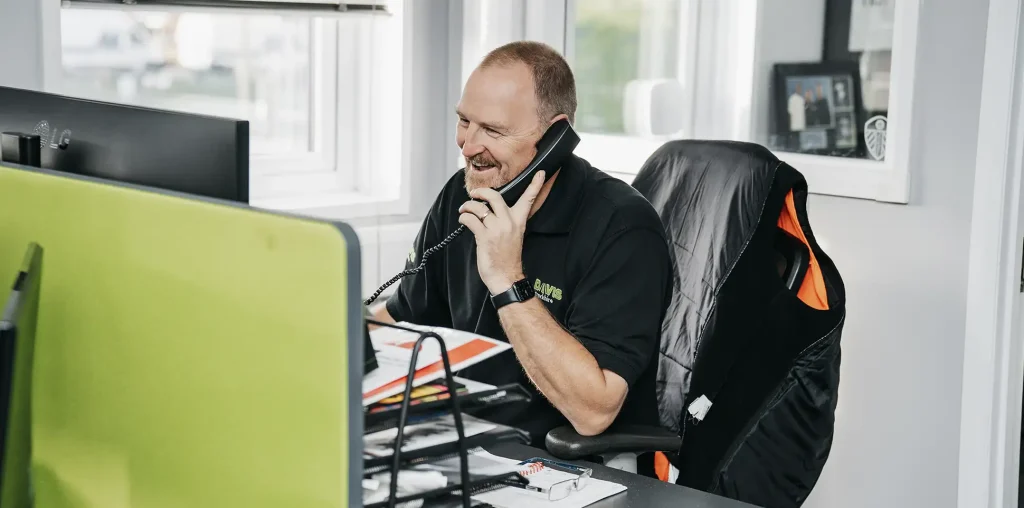
Our team includes Appointed Person to provide lift plans and technical information together with qualified on-site lift supervisors. Site drawings and safety job packs are issued to all our crews for each site and Daily / Dynamic Risk Assessments are completed by our experienced supervisors and operators to mitigate any risks during site operations.
All our specialist equipment is certified and checked prior to works commencing, all our staff are fully trained and wear full Personal Protective Equipment at all times during site operations. With multiple depots throughout the UK and an ever-expanding stockholding, we can be on-site installing within 24 hours of the initial enquiry.
What’s next for Davis Trackhire?
Continue to invest, not only in new products and safety features, but also in our people and culture and to be the market leader in the industry. We also hope that the next one to three years will see us open a third operational depot in the south of England to complement our existing locations in Lanarkshire and Nottinghamshire and increase our ever-expanding footprint.
We are also expanding our team of Project Engineers and Supervisors to allow us to react even quicker to last-minute enquiries and carry out more pre-site assessments to give our clients additional peace of mind that their project is in safe hands from start to finish.
There are plans in motion to increase our fleet of installation/recovery vehicles year-on-year and introduce out-of-cab remote driving system to all.
How do you make your business a good place to work?
We provide our staff with the very best equipment and training available in order to create a safe, productive and happy working environment, as demonstrated by our investments into the welfare units, remote drive system and internal hire management systems to name a few. We actively promote from within, which has resulted in all of our senior managers being temporary roadway specialists with over 150 years’ combined industry experience. By continuing to invest in our people and culture we provide our staff with the motivation, incentive and knowledge to progress within the business.
In terms of technology, how do you anticipate things might change in the next five to ten years?
With the introduction of the out-of-cab remote drive system, we are already starting to see a significant shift in the amount of manual labour required to carry out our on-site operations. We are also continuously looking at ways to modernise and evolve the products and services that we offer, including developing and investing in more bespoke accessories to compliment our temporary roadway systems to not only comply with, but surpass the ever-evolving HSE protocols within our line of work such as GS6 requirements, speed restriction, pedestrian and disabled access routes and cable crossings. Watch this space!
Credit: Written by Rail Professional, at www.railpro.co.uk. Read the published article in the latest February edition here – Rail Professional Magazine.
